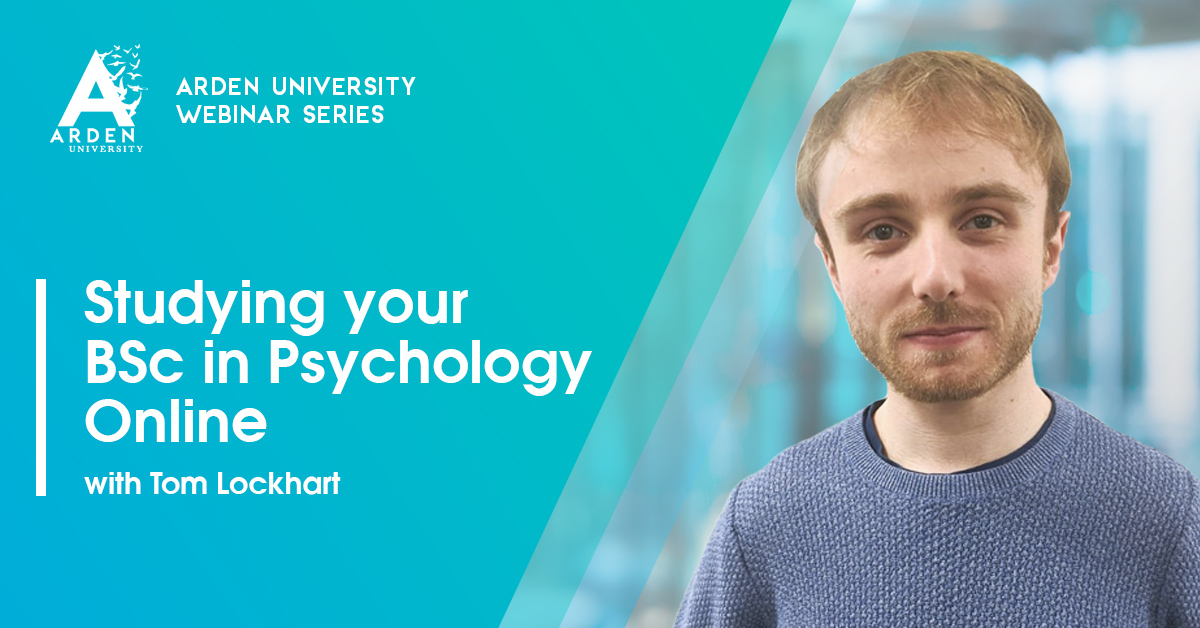Discover more about our online Psychology degree from tutor, Tom Lockhart, including the benefits of BPS accreditation and what careers it can prepare you for.
In a recent webinar with Psychology tutor, Tom Lockhart, he offered some interesting insights into our online BSc Psychology degree. Here, you can read our full interview with Tom - you can also visit our website to watch the webinar in your spare time.
Who is Arden University’s online BSc in Psychology designed for?
At its core, it’s designed for anyone that’s fascinated by the workings of the mind and people’s behaviour. It’s for students who are interested in taking a scientific approach to studying these topics and who might also want a career in research, clinical practice, social data analysis, scientific writing, teaching, or other human and animal-facing roles. Crucially though, it’s made for people who want to work, raise families, and live their lives while they study a course that will feed their passions and fuel their careers.
How does the programme reflect current trends and practices?
The course is taught by a wide range of research active academics and clinicians who will bring their cutting-edge knowledge of each subject area into their teaching. You’ll cover a number of important and challenging modules that touch on many modern real-world issues such as social and developmental psychology, personality and intelligence, brain and behaviour, and cross-cultural psychology. The extended research project towards the end of your degree will give you the chance to explore new ground and to make your own contribution to our current scientific understanding of psychology.
What are the benefits of studying a BPS-accredited degree?
The British Psychological Society accreditation is a crucial attribute to look for when you’re trying to find a strong and worthwhile psychology degree. Getting BPS accreditation means that the course content, assessments and teaching methods have met the BPS’s high standards of conduct. It also means that your degree will be globally recognised by employers and, assuming that you do well in your degree (which I’m sure that you will), it means that you will be eligible for graduate and, later, professional membership into the BPS.
What does a BSc in Psychology prepare you for?
Psychology graduates can go into a wide range of fields. If you’re interested in research, then your undergraduate degree is the first step into your sub-discipline of choice. If you’re interested in clinical practice, such as psychiatry, therapy or other mental health services, then the undergraduate degree will provide you with the key skills and certifications that you need to get onto clinical training courses. Otherwise, psychologists tend to make great data analysts, statisticians, consultants, writers, and teachers.
Can you outline some qualitative research methods that you enjoy teaching?
No, to be honest, I can’t personally, as I’m a quantitative researcher! That means that I prefer to work more with numerical data and statistics than with communicative data and interpretations. During your undergraduate degree, you’ll learn about both approaches. However, after graduating, most psychologists pick one route to specialise in and pigeonhole their knowledge and research from there. We have a lot of highly experienced qualitative researchers at Arden who will be very happy to take you through their favourite approaches.
What area of research interests you most?
In my research, I look at anxiety from multiple approaches, including how behaviour, personality, and brain activity relate to anxiety. For example, one of the big projects that I’m working on at the moment with researchers in Portsmouth, in the UK, and Otago, in New Zealand, is concerned with trying to find a diagnostic biomarker of anxiety. In other words, a way to run a biological test to see whether someone has anxiety, what kind of anxiety they have, and what treatment might work best for them, just like you would for most illnesses.




